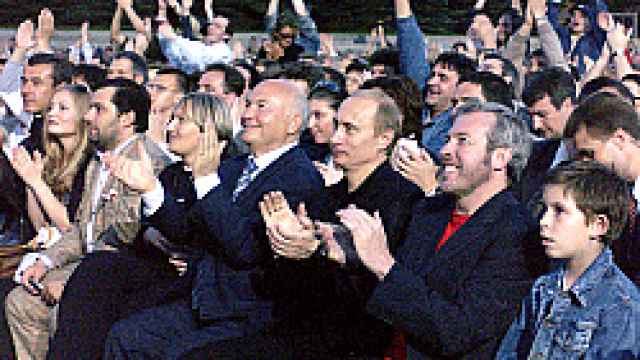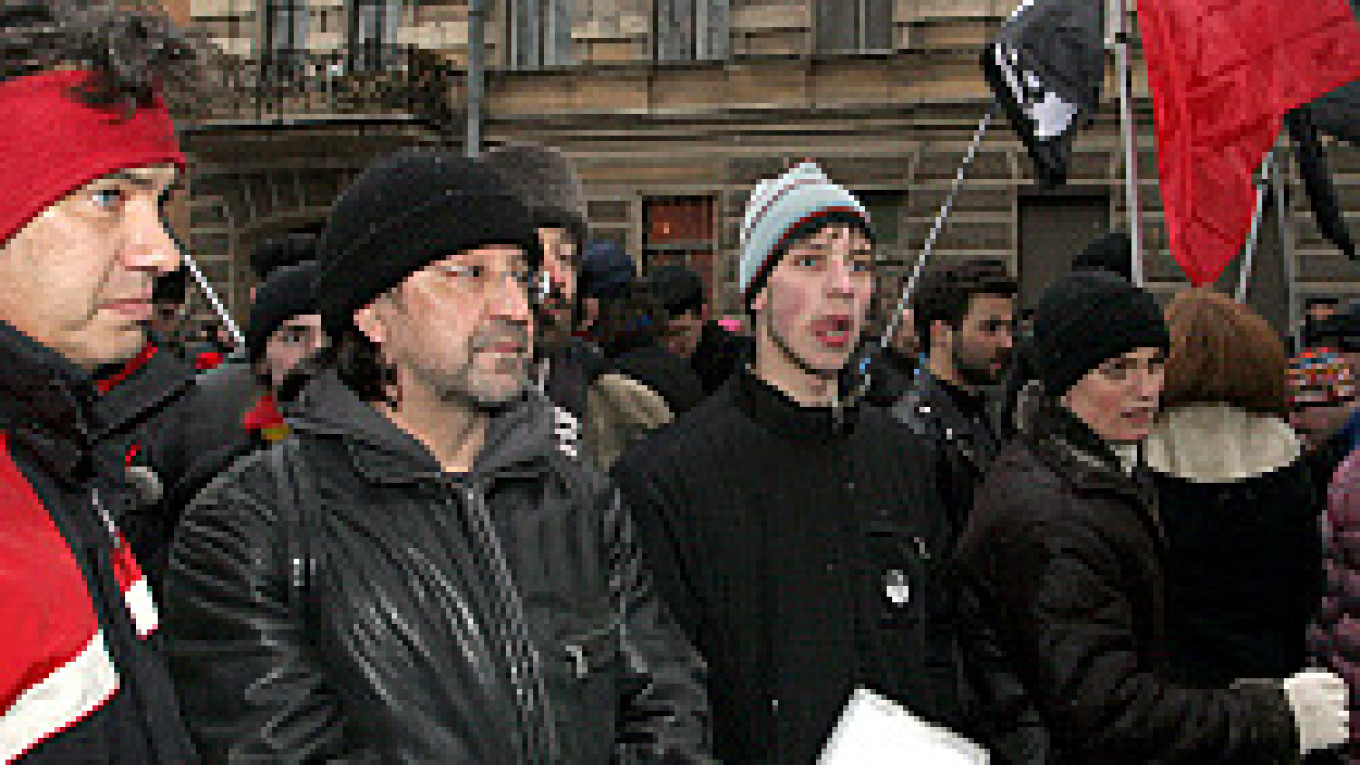Two days later, Yury Shevchuk, leader of the rock band DDT, joined a Dissenters' March in St. Petersburg protesting the election and gave a short speech expressing his support.
The musicians' participation in the respective events highlights a division running through Russia's rock scene. Veteran bands such as Alisa and Agata Kristi take part in flag-waving concerts organized by the Kremlin, while a few, such as DDT and punk band Televizor, openly criticize authorities.
When Makarevich gave an interview to Ekho Moskvy radio station a few days after the elections, more than 100 listeners e-mailed questions about the concert, almost all expressing disappointment that he took part.
"I can understand [patriotic pop band] Lyube taking part ?€” they're the dregs, but how did you turn up there?" asked Yevgeny, who said he was a businessman from St. Petersburg.
Makarevich declined to be interviewed for this article, saying he was busy on tour. But in comments posted on his official web site, he said he "wasn't ashamed" by the performance.
"I don't think Chaif and Splin and the other groups were either," he wrote. "No one herded us in and forced us to sing."
Rock musicians have long played a prominent role in Russian politics.
In the run-up to the 1996 presidential election, incumbent Boris Yeltsin's team organized concerts to encourage young people to vote, famously dancing on stage at one.
While Shevchuk refused to take part in the pro-Yeltsin concerts, Mashina Vremeni, Alisa, Chaif and Splin all signed up, said rock writer and Nashe Radio host Anton Chernin.
Other political forces also turned to rock to improve their ratings. In 1993, the Communist Party held rock concerts starring Grazhdanskaya Oborona, Chernin said, while in 2000, the Bit Bitva festival organized to support Yabloko turned into a mass brawl when skinheads showed up.
Makarevich's pro-Kremlin show following Medvedev's March 2 election came as no surprise to many in the rock world.
"I was quite amazed at the strong negative reaction to the fact that Mashina Vremeni played on Red Square, because for a very long time they haven't positioned themselves as an opposition band or as a rebel band of any kind," rock critic Artemy Troitsky said.
Troitsky described Makarevich as "a wealthy and well-placed person with many friends in top places."
At Paul McCartney's 2003 concert on Red Square, Makarevich sat next to President Vladimir Putin.
Shevchuk was brave to take part in the Dissenters' March, Troitsky said, since his association with it may mean fewer invitations to play at lucrative private parties and corporate events.
"It will definitely scare ?€¦ many people who are really afraid of showing any kind of disloyalty to the authorities," Troitsky said.
Veteran rocker Boris Grebenshchikov, who was banned from performing in Soviet times, expressed ambivalence about the nexus between rock and politics.
"If some of the musicians have some political views, that's their affair," Grebenshchikov said in an interview. "Makarevich performs for [authorities], Shevchuk performs against [them], and they have the complete right to do that.
"The main thing is that the music should be good. ?€¦ Who they perform for isn't important."
Shevchuk, who had previously given concerts in Chechnya and in Yugoslavia to protest the 1999 NATO bombings there, said through his spokeswoman that he was too busy to be interviewed because he was taking part in a film project in Ukraine.
But in an interview with Radio Liberty in March he said: "I don't like the spiritual conformism of many of my colleagues, who ?€¦ say one thing sitting in the kitchen, but spout something else from the stage. I think that's not rock music, that's not rock 'n' roll."
Symbols of Perestroika
The country's rock musicians have always had a convoluted relationship with power.
Until the late 1970s, bands were not allowed to record or give serious concerts, but they could play at dances and in restaurants, Chernin said.
Sergei Zharikov, leader and drummer of the now-defunct underground art-rock band DK, said the band used to play at collective farms on state-run tours.
Typically, the band would play Soviet standards, but if the audience at a collective farm turned out to be "alcoholics," they would play Deep Purple and Led Zeppelin covers, Zharikov said.
The situation became more tense in the early 1980s, when Soviet leader Konstantin Chernenko signed a decree banning all nonprofessional concerts. Bands would play in apartments, gathering a small fee from guests, Chernin said.
After playing at a rock festival in Tbilisi in 1980, Grebenshchikov's band, Akvarium, was banned. Grebenshchikov was expelled from the Komsomol and lost his job at a social sciences institute.
In 1984, Zharikov was accused of spreading anti-Soviet propaganda after DK performed at secret locations. "Someone snitched on us," he said.
 Alexei Panov / Itar-Tass Makarevich, second from right, with Putin at a Paul McCartney's 2003 show. | |
Yet Zharikov has fond memories of the KGB, whose young operatives, he said, were on the side of the musicians. The agents told the band to lay low so they could close the case for lack of evidence, Zharikov said. "It seems to me that clans were fighting each other high up," he said.
The situation was more relaxed in Leningrad, where the officially tolerated Leningrad Rock Club opened in 1981. It gave Akvarium and other underground bands such as Kino, Alisa and Televizor the opportunity to perform, even though it was closely supervised by authorities.
"The Leningrad Rock Club, as they say, was founded by the KGB," Grebenshchikov said, a fact he was unaware of at the time. "We weren't bothered about who founded it. The important thing to us was that we finally had the opportunity to give concerts."
In 1986, a similar club opened in Moscow, and Mashina Vremeni recorded its first album on the veteran Melodia label. From that point on, the label realized that it could make money from rock, Chernin said.
By 1987, Akvarium was able to perform at the Palace of Culture in Leningrad for 10 nights in a row. Grebenshchikov's song, "This Train is on Fire," written that year, has been called the anthem of perestroika. The lyrics include: "We were born to the sound of marches / We were threatened with prison / But it's time to stop crawling on our bellies."
During Perestroika, rock concerts helped the Soviet authorities, because they were a visible sign that the country was opening up, Zharikov said.
"It was important for [Soviet leader Mikhail] Gorbachev to show the world that he had introduced reforms he couldn't reverse," he said.
But the euphoria did not last. Musicians felt that they were being used to "distract the people," Zharikov said.
Grebenshchikov said Russian rock died in the early 1990s. "The phenomenon that we call Russian rock had meaning only when that so-called rock was banned," he said. "As soon as all music was permitted, it became clear that this kind of rock was important only during the time of the struggle for our rights."
Rocking Lake Seliger
Perhaps the most notorious encounter between Russian rock and politics came in March 2005, when musicians including Grebenshchikov, Zemfira, Vyacheslav Butusov and Sergei Shnurov, as well as the bands Splin and B2, were invited to meet Vladislav Surkov, deputy head of the presidential administration and the Kremlin's chief ideologist.
Speculation swirled at the time that the meeting was aimed at enlisting musicians' support in the event of a color revolution in Russia similar to those in Ukraine and Georgia.
Grebenshchikov said, however, that the goal of the meeting was to promote rock music by involving the stars in radio and television projects. The Akvarium leader later started his own show on state-owned Radio Rossia.
A lesser-known participant in the meeting was Konstantin Vetrov, a State Duma deputy from the Liberal Democratic Party who was a classmate of Surkov's. In 2003, he produced an album of Surkov's rock songs, performed by Vadim Samoilov of Agata Kristi.
After the meeting, Vetrov founded a charitable foundation and arts center called Our Time, which focuses on searching for new rock bands and giving them the chance to perform and record.
Our Time has a recording studio and rehearsal rooms. It also publishes a rock magazine and runs an annual festival.
Vetrov declined to name the donors who finance the work of Our Time, saying only that they are businessmen. The presidential administration gave some initial help, he said.
"In his time, in the early days, [Surkov] helped a little bit," Vetrov said. "He asked for only one thing in return: that we do our work honestly and enrich Russia with new talents."
Our Time organized concerts at retreats held by pro-Kremlin youth group Nashi at Lake Seliger in 2005 and 2006, and several Our Time musicians also played for free at last summer's Russia Day concert on Red Square.
Vetrov denied any political overtones at the Nashi concerts, saying the musicians did not shout any slogans. "If we'd been asked to play at the camp of some democratic forces, we would probably have considered that offer," he said.
The Nashi concerts did have repercussions for some of the better-known musicians who played there, however. After Vyacheslav Butusov performed in 2006, his former lyricist, Ilya Kormiltsev, wrote a widely publicized blog post asking Butusov not to play his old songs at such events.
Zemfira changed her management after playing one such concert, said Chernin, the rock writer.
Aside from Grazhdanskaya Oborona leader Yegor Letov, who died earlier this year, one of the few musicians who has consistently expressed anti-establishment views in his music is Mikhail Borzykin of the St. Petersburg band Televizor, who has taken part in five Dissenters' Marches.
In 2006, Borzykin wrote a song that he said was about the division that has formed among rock musicians. Entitled "We are on Different Sides of the Barricades," it includes the lyrics: "There is a VIP zone around the gates of heaven, and the barricades all around are like a Berlin Wall."
Borzykin was curt about musicians who cooperate with the authorities, including Makarevich. He ironically speculated that they are short of funds.
"I'm even sorry for those guys," Borzykin said. "We need to start collecting money urgently to help them."
A Message from The Moscow Times:
Dear readers,
We are facing unprecedented challenges. Russia's Prosecutor General's Office has designated The Moscow Times as an "undesirable" organization, criminalizing our work and putting our staff at risk of prosecution. This follows our earlier unjust labeling as a "foreign agent."
These actions are direct attempts to silence independent journalism in Russia. The authorities claim our work "discredits the decisions of the Russian leadership." We see things differently: we strive to provide accurate, unbiased reporting on Russia.
We, the journalists of The Moscow Times, refuse to be silenced. But to continue our work, we need your help.
Your support, no matter how small, makes a world of difference. If you can, please support us monthly starting from just $2. It's quick to set up, and every contribution makes a significant impact.
By supporting The Moscow Times, you're defending open, independent journalism in the face of repression. Thank you for standing with us.
Remind me later.


